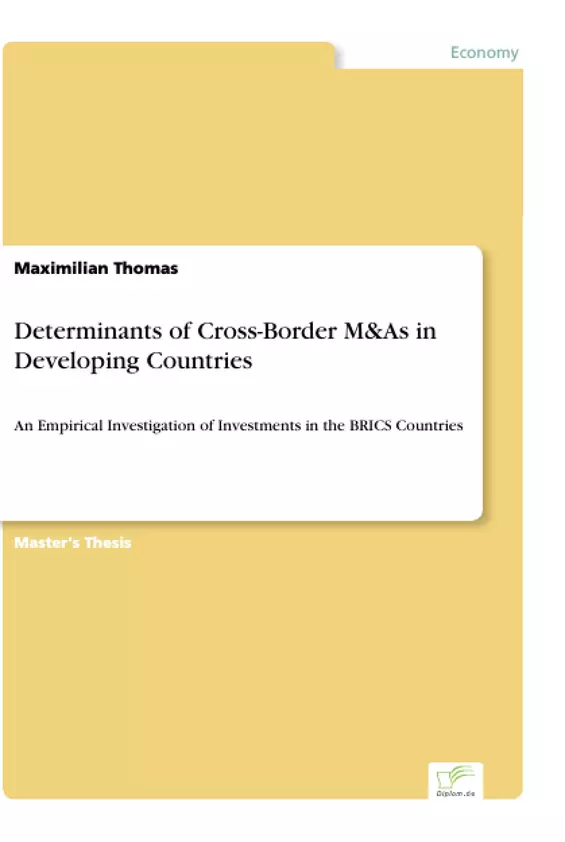Veröffentlichen auch Sie Ihre Arbeiten - es ist ganz einfach!
Mehr Infos
Determinants of Cross-Border M&As in Developing Countries
Masterarbeit, 2020, 96 Seiten
Autor

Kategorie
Masterarbeit
Institution / Hochschule
Note
1,3
During the last three decades, the importance of cross-border mergers and acquisitions (M&As) as a favourite top-level managerial strategy of multinational enterprises (MNEs) and national champions has increased significantly. The global value of cross-border M&As has grown from around USD 100 billion in 1990 to USD 815 billion in 2018, peaking in 2007 with over USD 1 trillion just before the outbreak of the global financial crisis. This development is not surprising, since the ongoing globalization and the changing global market landscape lead to more complex challenges for companies. In order to face the increasing intensity of competition that accompanies the global integration of markets, cross-border M&As constitute an appropriate way of maintaining competitiveness and creating added value. The acquisition of pre-existing foreign assets enables MNEs not only to exploit synergies and growth opportunities but also to overcome latecomer disadvantages. In addition, M&As offer a time advantage over organic growth strategies such as greenfield investments, which is particularly important considering the dynamic market conditions and the shortening product life cycles.
This thesis examines the research question of which country-specific factors determine the volume of inbound cross-border M&As in developing economies. In general, the choice of a cross-border acquisition as an entry mode into a foreign market is influenced by three types of factors: (1) firm-specific factors such as prior acquisition experience, product diversity and core competences; (2) industry-specific factors such as technological, sales and marketing intensity; and (3) country-specific factors such as market size and institutional quality. While firm- and industry-specific factors also play a role in domestic M&As, country-specific factors are a peculiarity in cross-border M&As. According to the research question, the aim of this thesis is to identify country-specific factors that represent determinants. On the one hand, findings on country-specific determinants might be helpful to explain why some countries (e.g. China) receive more cross-border M&As than others (e.g. India). On the other hand, the results reveal which interests transnational companies pursue and how they change. Drawing on this evidence, policy makers and companies may be able to influence the determining factors in order to stimulate or impede inbound investments in form of M&As.
Details
- Titel
- Determinants of Cross-Border M&As in Developing Countries
- Untertitel
- An Empirical Investigation of Investments in the BRICS Countries
- Autor
- Erscheinungsjahr
- 2020
- Seiten
- 96
- Katalognummer
- V914803
- ISBN (PDF)
- 9783961163755
- ISBN (Buch)
- 9783961168750
- Sprache
- Englisch
- Schlagworte
- M&A Mergers and Acquisitions Cross-Border M&A Developing Countries BRICS Countries Determinants Panel Data Macroeconomic Factors Institutional Factors Financial Market Factors
- Produktsicherheit
- Diplom.de
- Arbeit zitieren
- , 2020, Determinants of Cross-Border M&As in Developing Countries, Hamburg, Bedey Media GmbH, https://www.diplom.de/document/914803

Deutschlands größter Sharing Community
Jetzt Zusammenfassungen, Skripte und Klausuren kostenlos downloaden!
Uniturm.de
Ihre Vorteile als Autor
Geld verdienen Für jedes verkaufte Exemplar erhalten Sie Autorenhonorar - bis zu 40%.Kostenlose Buchveröffentlichung
Als eBook-Studie im Original und / oder auf Wunsch zusätzlich als hochwertiges Fachbuch in unserem renommierten Buchverlag.
Renommee als Fachbuchautor
Präsentieren Sie sich als Fachfrau oder Fachmann in Ihrem Fachgebiet und machen Sie sich bekannt.
Persönliche Betreuung
Unser Lektorat wird Sie persönlich betreuen und ist auch telefonisch unter +49(0)176-85996762 erreichbar.
Weltweit im Buchhandel
Ihr Buch ist weltweit im Buchhandel und Online-Buchhandel wie z.B. amazon erhältlich.
Jetzt Autor werden!
- Copyright
- © Bedey & Thoms
Media GmbH - seit 1997
- Alle Inhalte urheberrechtlich geschützt. Kopieren und verbreiten untersagt.
-
Diplom.de steht seit 1996 für die professionelle und
hochwertige Veröffentlichung akademischer
Abschlussarbeiten im Original als eBook und Buch.
-
Bachelorarbeiten, Masterarbeiten, Diplomarbeiten,
Magisterarbeiten, Dissertationen und andere
Abschlussarbeiten aus allen Fachbereichen
und Hochschulen können Sie bei uns als eBook
sofort per Download beziehen oder sich als Buch
zusenden lassen.




